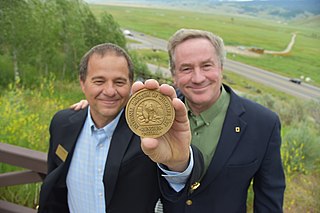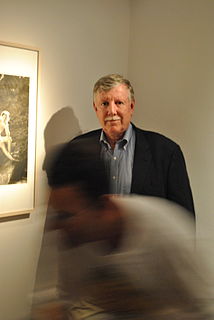A Quote by Joel Sartore
It is folly to think that we can destroy one species and ecosystem after another and not affect humanity. When we save species, we're actually saving ourselves.
Related Quotes
We [people] have the power to destroy ourselves as well as the environment. As a species we love what I'd call brinks-person-ship, going right to the edge of disaster and somehow managing to pull back and recover. But my bet is still on the creative and playful and positive in the species. I think we will manage to survive and gradually turn things around.
Perhaps walking is best imagined as an 'indicator species,' to use an ecologist's term. An indicator species signifies the health of an ecosystem, and its endangerment or diminishment can be an early warning sign of systemic trouble. Walking is an indicator species for various kinds of freedom and pleasures: free time, free and alluring space, and unhindered bodies.
If we consider the superiority of the human species, the size of its brain, its powers of thinking, language and organization, we can say this: were there the slightest possibility that another rival or superior species might appear, on earth or elsewhere, man would use every means at his disposal to destroy it.
Humanity is part of nature, a species that evolved among other species. The more closely we identify ourselves with the rest of life, the more quickly we will be able to discover the sources of human sensibility and acquire the knowledge on which an enduring ethic, a sense of preferred direction, can be built.
We ourselves are part of a guild of species that lie within and without our bodies. Aboriginal peoples and the Ayurvedic practitioners of ancient India have names for such guilds, or beings made up (as we are) of two or more species forming one organism. Most of nature is composed of groups of species working interdependently.
A large animal needs a large area. If you protect that area, you're also protecting thousands of other plants and animals. You're saving all these species that future generations will want - you're saving the world for your children and your children's children. . . . The destruction of species is final. If you lose a species, you lose the genes, you lose all the potential drugs and potential foods that could be useful to the next generations. The ecosystems will not function as they have.
'Extinction' issue. Save the species for whom??? Humans' convenience, of course! Individuals of the species are snatched from their homes/family/habitat/held in captivity/forced to mate at great physical/ spiritual pain. When the right numbers are reached, their holocaust starts all over again! Another merry-go-round/ bu$ine$$ a$ u$ual!!! Protectionists/welfarists find it a profitable issue: no controversy/ easy donations! I'd rather see an entire species extinct than in the hands of the humans!
There are millions of different species of animals and plants on earth--possibly as many as forty million. But somewhere between five and fifty BILLION species have existed at one time or another. Thus, only about one in a thousand species is still alive--a truly lousy survival record: 99.9 percent failure!



































